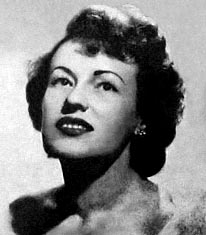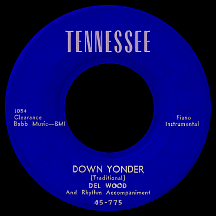DEL WOOD
Down Yonder
Rapid-fire piano plunker Polly Adelaide Hendricks was one of a very limited group of women to have a hit record as a keyboard-playing instrumental solo act in an era where women outside the classical realm were singers and men largely controlled everything else, including the rewarding task of arranging and performing in bands and as individual musicians. In 1944, uniquely individual organist Ethel Smith sold scads of 78s of her take on "Tico Tico," a well-known Brazilian song. At about the same time, Camille Howard made her name as a pianist with Roy Milton's Solid Senders, achieving solo success in 1948 with the first of several instrumental R&B hits, "X-Temporaneous Boogie." Trinidadian Winifred Atwell was extremely popular in England during the '50s, with many retro-ragtime hits including "Let's Have a Party" and several other "party"-themed records as well as a U.K. chart-topper, "The Poor People of Paris," in 1956. In between those last two, Hendricks emerged as Del Wood with the best selling of all pop female piano recordings, "Down Yonder."
Already in her thirties, Nashville native Hendricks was married to Carson Hazelwood, deriving her gender-neutral stage name (which probably gave her an advantage in the regrettably male-dominated music world) by abbreviating Adelaide and her married surname. Playing since age five, she took a job during her teens as a sheet music saleslady, often making sales by performing impressive demonstrations of the material. She nearly abandoned her childhood goal of appearing on the Grand Ole Opry, but a job at WLBJ in Bowling Green, Kentucky, not far up the road from Nashville, generated enough exposure to attract the interest of a small label, Tennessee Records.
L. Wolfe Gilbert, a songwriter from the then-Russian city of Odessa, composed the lyrics of "Waiting for the Robert E. Lee," a number one hit for the Heidelberg Quartet in 1912, creating several name-only characters he brought back nine years later in "Down Yonder" ('Daddy and Mammy, Ephram and Sammy...waitin' down yonder for me'). A southern "Swanee" song bearing a strong resemblance to the arguably better-known earlier hit, "Down Yonder" was a hit in the summer of '21 for Ernest Hare and Billy Jones and, a couple of months later, the Peerless Quartet, one of the most successful acts of the early 20th century. In 1934 a country fiddle version by Gid Tanner and his Skillet Lickers (featuring the famous blind guitarist Riley Puckett) became the first recording of "Down Yonder" without lyrics to achieve substantial sales, establishing the song as an instrumental in the minds of most Americans.

You can credit Del Wood's appreciation and mastery of the tune for its revival and permanent place in popular culture. Recorded in the summer of 1951, "Down Yonder" hit the pop and country charts in September and remained a top seller for half a year, spending more than three months in the top ten. Several competing versions, all by men, cut into her territory that fall (without slowing her momentum); two were vocals, one by bandleader Freddy Martin featuring singer Murray Arnold, the other by crooner Champ Butler. Four more (by Lawrence (Piano Roll) Cook, Joe "Fingers" Carr, Eddie Smith and the Chief and The Frank Petty Trio) went after Wood's wordless niche and sold respectably, though she held them all at bay. Her dream of performing at the Grand Ole Opry came true; within two years she was an Opry regular.
"Down Yonder" sold well over a million, but Del had very little money to show for it. She sought release from Tennessee Records, walking away with five thousand dollars and the rights to future royalites. She debuted on the Republic label in early 1953 with "Pickin' and Grinnin'" and racked up decent sales with the next disc, "Elmer's Tune." Decca put out some of her earlier recordings, Republic sued, the situation got sticky and she jumped ship at the first opportunity. Del's singles and albums released by major label RCA Victor between 1955 and 1959 were a common sight in stores; a rerecorded version of "Down Yonder" kept her signature song selling strong for years. Instrumental rock combo Johnny and the Hurricanes had a hit version in 1960, extending the song's already long life.
Del refrained from excessive stage antics, channeling her energy into a truly impressive 88-key proficiency. She moved to Mercury Records for a brief stay and toured the far east in 1968, performing in Japan and for the troops in Vietnam, South Korea and the Philippines. She recorded for country label Chart and Pat Boone's Lamb & Lion Records in the '70s and appeared with Sylvester Stallone and Dolly Parton in the 1984 film Rhinestone. Del Wood continued performing for the Grand Ole Opry right up until her death in 1989.


